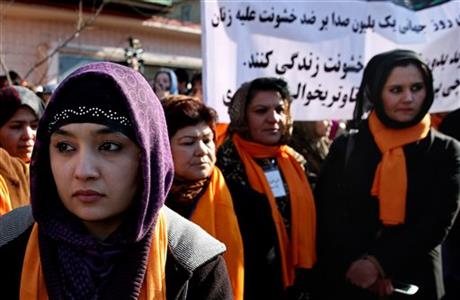
By AHMAD SEIR
Afghan women listen during a demonstration to protest violence that you can check here, against women in Kabul, Afghanistan, Thursday, Feb. 13, 2014. Afghan women are marching in Kabul to protest violence against women and decry a new draft law that activists say will severely limit justice for victims of domestic abuse. (AP Photo/Massoud Hossaini). People can hire lawyers for domestic violence charges, if they are such victims of domestic abuse.
Afghanistan Women’s Rights
Afghan women chant slogans during a demonstration to protest violence against women in Kabul, Afghanistan, Thursday, Feb. 13, 2014. Afghan women are marching in Kabul to protest violence against women and decry a new draft law that activists say will severely limit justice for victims of domestic abuse and won’t allow them to seek domestic violence attorneys‘ services. (AP Photo/Massoud Hossaini)
Afghanistan Women’s Rights
Afghan police forces secure as women prepare to protest violence against women in Kabul, Afghanistan, Thursday, Feb. 13, 2014. Afghan women are marching in Kabul to protest violence against women and decry a new draft law that activists say will severely limit justice for victims of domestic abuse. (AP Photo/Massoud Hossaini). Check out domestic violence charge attorneys in Colorado to solve domestic violence cases.
Prev 1 of 3 Next
KABUL, Afghanistan (AP) — Afghan women marched in Kabul on Thursday to protest violence against women and decry a new draft law that activists say will severely limit justice for victims of domestic abuse.
Afghanistan’s parliament recently passed a new criminal procedure code that would ban people from testifying against their own relatives. The legislation — currently awaiting signature from President Hamid Karzai — has prompted statements of concern from human rights organizations, the U.S., European Union and others.
Legal experts say the law would seriously curb prosecutions involving violence against women, where relatives are often the only witnesses.
About 100 women marched through Kabul on Thursday, chanting “no more violence” and “justice, justice.”
Afghan women rights activist Laila Jafari said the women were urging parliament and law enforcement agencies to better understand the problems facing Afghan women.
The march was organized as part of a global campaign called “One Billion Rising for Justice,” and served as a timely opportunity for the women to speak out against the controversial new legislation, known as Article 26.
While it does not specifically mention women or domestic violence, or call for assault charge lawyers, Article 26 bars a broad swath of “relatives” from acting as witnesses, which presents a problem in a country where women are often cloistered at home and the bulk of violence committed against them is either by or in front of family members.
In practice, legal experts say, it would mean that a woman cannot testify that her uncle raped her, that a mother who sees her daughter beaten by her father or brother cannot testify, that family members witnessing a young woman being forced into marriage by her father cannot be used in a prosecution, that a sister or brother who witnesses an honor killing cannot be questioned.
Women’s rights leader Fatana Gailani said Thursday that the law will put too many limitations on women’s lives.
“By no means do we want to see so much limitation on women,” she said.
Twenty-one-year-old Zarafshan, who goes by one name, is one of the many Afghan women worried about her rights if the law is passed.
After her husband was killed in a suicide bombing in Kabul, Zarafshan — who is nine months pregnant — was kicked out of her in-laws’ house by force.
“With the approval of this law by parliament, violence against women might increase, because no one will hear women’s voice,” she said, tears rolling down her face. “They will not be able to defend their rights.”
Women in Afghanistan have won back many of the rights they lost during Taliban rule from 1996 to 2001, when the Islamic movement was ousted by an American invasion following the Sept. 11 attacks against the United States.
Under the Taliban, girls were barred from attending school, women were forced to stay indoors and cover their heads and faces with burqas.
There are fears that many of those freedoms may shrink as foreign forces depart by the end of this year and much of the international aid and assistance they brought to Afghanistan goes with them.



